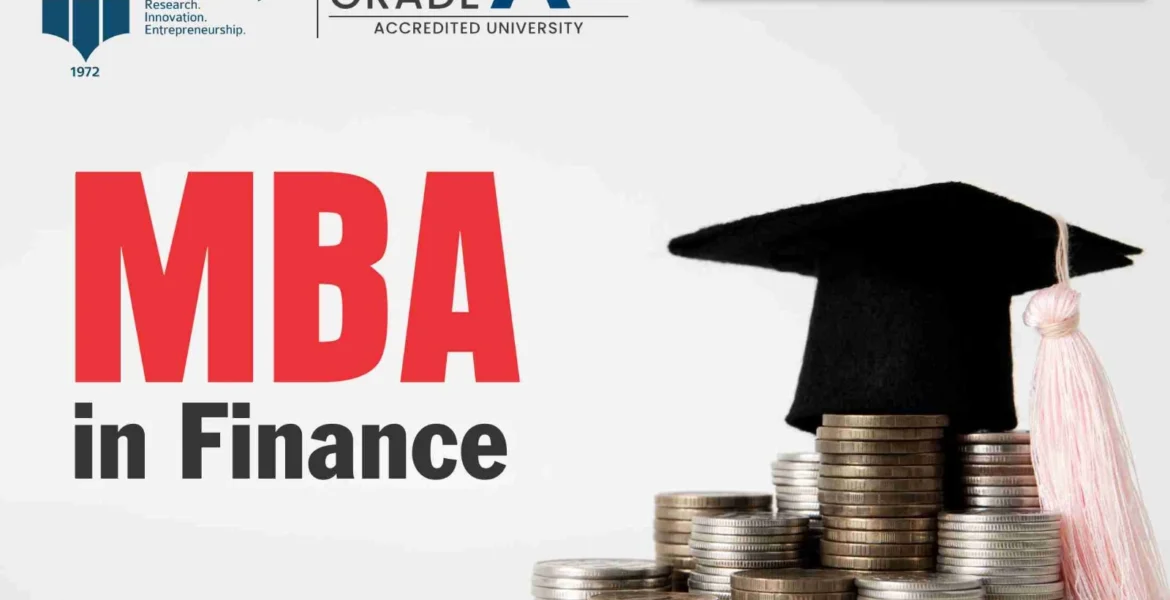MBA in Finance in India: Details, Salary, Scope, Fees & Eligibility
August 20, 2025 2025-08-20 11:13MBA in Finance in India: Details, Salary, Scope, Fees & Eligibility

MBA in Finance in India: Details, Salary, Scope, Fees & Eligibility
What is an MBA in Finance?
An MBA in Finance is a postgraduate degree that focuses on managing the financial aspects of businesses and organizations. It is one of the most popular specializations within the MBA program. This degree helps individuals understand the workings of financial markets, investment strategies, and how to manage financial resources efficiently. With an MBA in Finance, you can pursue careers in banking, corporate finance, investment management, financial planning, and more.
In today’s competitive world, an MBA in Finance provides you with the skills needed to make informed financial decisions, analyze financial data, and understand the complexities of financial markets. This degree also opens doors to high-paying job roles and career growth in various industries.
MBA in Finance Course Details at Desh Bhagat University
Desh Bhagat University (DBU) offers a well-rounded MBA in Finance program designed to prepare students for leadership roles in the financial sector. The program is structured to provide both theoretical knowledge and practical skills in financial management.
Course Structure and Duration
The MBA in Finance program at DBU lasts for two years. It is divided into four semesters, with each semester focusing on specific aspects of finance. The curriculum is designed to cover both core subjects and elective subjects. Core subjects are mandatory for all students, while elective subjects allow you to specialize in areas that interest you, such as banking, investment management, or risk management.
Core MBA in Finance Courses
Some of the core courses that you will study during the MBA in Finance program at DBU include:
- Financial Accounting: Learn about the basics of accounting and how businesses track their financial activities.
- Corporate Finance: Understand how companies raise capital, manage financial resources, and make investment decisions.
- Investment Management: Explore the different types of investments, including stocks, bonds, and real estate, and learn how to build a diversified portfolio.
- Risk Management: Study the strategies businesses use to identify, assess, and mitigate financial risks.
- Financial Markets and Institutions: Gain insights into the functioning of financial markets, such as stock exchanges, and understand the role of institutions like banks and investment firms.
Elective MBA in Finance Courses
In addition to core courses, DBU offers several electives that allow students to specialize in specific areas. Some of these electives include:
- Banking and Financial Services: Learn about the operations and regulations of banks and other financial institutions.
- Financial Planning: Gain skills in helping individuals and organizations manage their finances for long-term success.
- Taxation: Understand the tax laws and policies that impact businesses and individuals.
- Derivatives and Commodities: Study the financial instruments used to manage risk and trade commodities in the global market.
Practical Exposure
DBU believes in providing practical exposure to its students. As part of the MBA in Finance program, students have opportunities to:
- Participate in internships at leading financial institutions.
- Attend guest lectures by industry experts.
- Engage in workshops and seminars on emerging financial trends.
- Solve real-world case studies to apply what they have learned in class.
These practical experiences help students gain hands-on knowledge of the financial sector and prepare them for their careers after graduation.
MBA in Finance Eligibility at DBU
To be eligible for the MBA in Finance program at DBU, candidates need to meet the following requirements:
Educational Qualifications
- You must have a Bachelor’s degree in any discipline (e.g., Arts, Commerce, Science, Engineering) with a minimum of 45% marks from a recognized university.
Additional Requirements
- Candidates must submit relevant academic documents and identification proof during the application process.
- Depending on the performance in entrance exams (if applicable) and interviews, the final selection will be made.
MBA in Finance Fees at DBU
The MBA in Finance fees at Desh Bhagat University are structured to be affordable and competitive. The fees cover tuition, examination, and other related charges for the entire program. DBU also offers financial aid and scholarships to deserving students based on merit and need.
The exact fees can vary depending on the specialization chosen and other factors, so it’s advisable to call or contact the admissions office for detailed and up-to-date information on the fee structure.
Scope of MBA in Finance in India
An MBA in Finance from Desh Bhagat University provides a wide range of career opportunities. The scope of MBA in Finance in India is vast, with demand for finance professionals continuously growing in various sectors. Some of the industries that require finance professionals include:
- Banks and Financial Institutions: Banks, insurance companies, mutual funds, and other financial institutions require finance professionals to manage their financial operations.
- Corporate Sector: Large corporations need finance managers to oversee budgeting, financial planning, and investment decisions.
- Government and Public Sector: Government agencies and public sector undertakings (PSUs) often hire MBA in Finance graduates for financial management roles.
- Consulting Firms: Consulting companies need experts who can advise businesses on financial strategies, risk management, and market opportunities.
An MBA in Finance also opens up opportunities in financial planning, investment banking, and corporate finance, allowing you to take on leadership roles in financial decision-making processes.
MBA in Finance Salary in India
The MBA in Finance salary in India varies depending on the role, experience, and company you work for. However, on average, MBA in Finance graduates can expect to earn:
- Entry-Level Salaries: ₹3,00,000 to ₹6,00,000 per annum. In this phase, you will likely start as a financial analyst, investment advisor, or banking associate.
- Mid-Level Salaries: ₹6,00,000 to ₹12,00,000 per annum. With a few years of experience, you may be promoted to roles such as corporate finance manager, risk manager, or financial consultant.
- Senior-Level Salaries: ₹12,00,000 to ₹25,00,000 or more per annum. Senior positions like CFO (Chief Financial Officer) or investment banker can offer substantial salaries.
The salary can vary based on the company, the role, and the city where you work. Top firms and global financial institutions tend to offer higher salaries compared to smaller companies.
Why Choose DBU for MBA in Finance?
Choosing Desh Bhagat University for your MBA in Finance offers many advantages:
Accredited Programs
DBU’s MBA in Finance program is recognized by UGC (University Grants Commission) and AICTE (All India Council for Technical Education), ensuring that the curriculum meets high educational standards.
Experienced Faculty
DBU’s MBA program is taught by industry experts and academicians who bring real-world knowledge into the classroom. They help students understand complex financial concepts and provide valuable insights into the finance industry.
Industry Connections and Placements
DBU has strong ties with various industries, offering internships and placements in top financial institutions. The university’s placement cell helps students connect with leading employers and secure rewarding job opportunities after graduation.
Practical Learning
The MBA in Finance program at DBU includes practical exposure through internships, workshops, seminars, and live projects. This helps students gain hands-on experience and be industry-ready by the time they graduate.

Career Opportunities after MBA in Finance
Graduates with an MBA in Finance from DBU can pursue various career paths, including:
- Financial Analyst: Analyzing financial data to help businesses make strategic decisions.
- Investment Banker: Assisting clients in raising capital and advising on investment strategies.
- Risk Manager: Identifying, assessing, and managing financial risks in businesses.
- Corporate Finance Manager: Managing a company’s financial operations and making decisions on investments and budgets.
- Financial Consultant: Providing advice to businesses and individuals on financial matters, including taxes, investments, and financial planning.
The demand for qualified finance professionals continues to grow, making an MBA in Finance from DBU a valuable degree for career advancement.
Conclusion
An MBA in Finance from Desh Bhagat University provides you with the knowledge, skills, and practical experience needed to succeed in the competitive world of finance. With a well-structured curriculum, practical exposure, and strong industry connections, DBU ensures that its graduates are well-equipped to take on leadership roles in the financial sector.
Whether you want to work in banking, investment management, corporate finance, or start your own financial consultancy, an MBA in Finance from DBU is your gateway to a rewarding career.
FAQs
1. What is MBA in Finance?
MBA in Finance is a postgraduate program that teaches students how to manage money and financial resources for businesses. It covers topics like accounting, investment, financial planning, corporate finance, and risk management. Students learn how to analyze financial data, make smart financial decisions, and grow businesses successfully.
2. What is the duration of MBA in Finance at DBU?
The MBA in Finance at Desh Bhagat University is a two-year program. It is divided into four semesters, and each semester focuses on different aspects of finance. Students learn both theoretical concepts and practical skills during these two years, which prepares them for real-world financial roles in industries.
3. What are the eligibility criteria for MBA in Finance at DBU?
To join the MBA in Finance program at DBU, candidates must have a bachelor’s degree in any field with at least 45% marks.
4. What are the fees for MBA in Finance at DBU?
The MBA in Finance fees at Desh Bhagat University are structured to be affordable. Fees cover tuition, exams, and other charges for the full two-year program. The university also provides scholarships and financial aid for students based on merit and need. For exact details, candidates should call or visit.
5. What courses are included in MBA in Finance at DBU?
The MBA in Finance program at DBU includes core courses like financial accounting, corporate finance, investment management, risk management, and financial markets. It also offers electives such as banking and financial services, taxation, derivatives, and financial planning. The program combines theory with practical learning through case studies and workshops.
6. What is the scope of MBA in Finance in India?
MBA in Finance offers a wide scope in India. Graduates can work in banks, investment firms, corporate sectors, government organizations, and consulting companies. There is strong demand for finance professionals, and the career options are growing every year. It is a promising path for those who want stable and high-paying jobs.
7. What is the average salary of MBA in Finance in India?
The salary for MBA in Finance graduates in India varies. Entry-level salaries are around ₹3–6 lakh per year. Mid-level professionals can earn ₹6–12 lakh per year. Senior-level roles like CFOs or investment bankers can earn ₹12–25 lakh or more per year. Salary depends on experience, company, and city of work.
8. What are the career options after MBA in Finance?
After an MBA in Finance, students can work as financial analysts, investment bankers, risk managers, corporate finance managers, or financial consultants. They can join banks, investment firms, government organizations, or large corporations. The degree also allows entrepreneurship in economic consultancy. Many career paths offer growth and high salary potential.
9. Why should I choose DBU for MBA in Finance?
Desh Bhagat University offers a robust MBA in Finance program, featuring experienced faculty, an industry-relevant curriculum, and practical learning opportunities through internships and projects. DBU is recognized by UGC and AICTE, ensuring quality education. The university also has strong industry connections to help students with placements and career guidance.
10. Does MBA in Finance provide practical experience?
Yes. DBU focuses on practical learning in its MBA in Finance program. Students participate in internships, workshops, seminars, and live projects. They also analyze real-world case studies and attend guest lectures by finance experts. This hands-on experience prepares them to work confidently in banks, corporations, and financial institutions after graduation.





